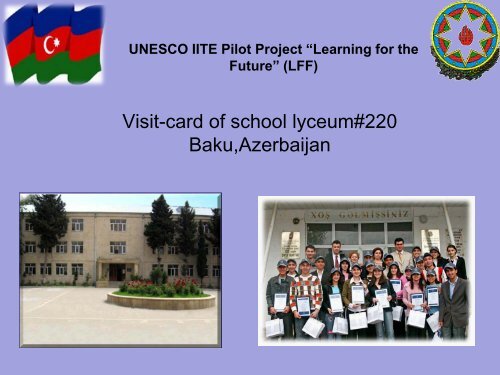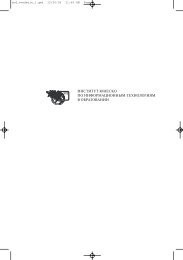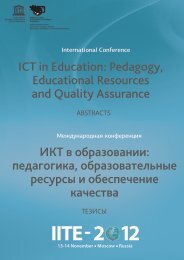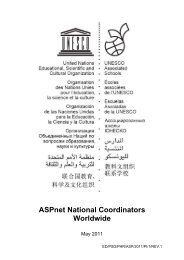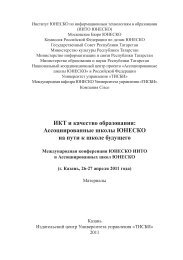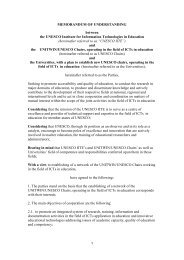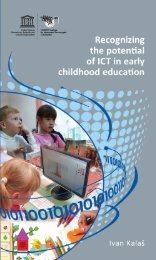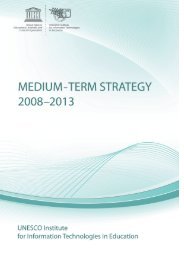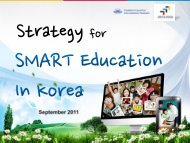Visit-card of school lyceum#220 Baku,Azerbaijan - Unesco
Visit-card of school lyceum#220 Baku,Azerbaijan - Unesco
Visit-card of school lyceum#220 Baku,Azerbaijan - Unesco
Create successful ePaper yourself
Turn your PDF publications into a flip-book with our unique Google optimized e-Paper software.
UNESCO IITE Pilot Project “Learning for the<br />
Future” (LFF)<br />
<strong>Visit</strong>-<strong>card</strong> <strong>of</strong> <strong>school</strong> <strong>lyceum#220</strong><br />
<strong>Baku</strong>,<strong>Azerbaijan</strong>
Geographical position <strong>of</strong> <strong>Azerbaijan</strong><br />
. The Republic <strong>of</strong> <strong>Azerbaijan</strong> lies in the borderlands <strong>of</strong> Asia and Europe. It is<br />
situated in the south-eastern part <strong>of</strong> the Southern Caucasus and shares<br />
borders in the north with the Russian Federation, in the south with the Islamic<br />
Republic <strong>of</strong> Iran, in the west with Turkey, Georgia and Armenia, and in the<br />
east its neighbors across the Caspian Sea are Kazakhstan and<br />
Turkmenistan.
<strong>Baku</strong><br />
<strong>Baku</strong> , one <strong>of</strong> the most beautiful cities <strong>of</strong> the world, is<br />
located at the meeting-point <strong>of</strong> Europe and Asia . The<br />
very name <strong>of</strong> the capital is interpreted as "wind blow”,<br />
“windy city” or "hill", “city on a hill”.
<strong>Baku</strong><br />
Port city <strong>Baku</strong> , a cultural, industrial,<br />
political capital <strong>of</strong> <strong>Azerbaijan</strong> , is<br />
located on the western coast <strong>of</strong> the<br />
Caspian Sea , on the shores <strong>of</strong> the<br />
same name gulf in southern part <strong>of</strong><br />
Absheron Peninsula rich in oil<br />
deposits.<br />
<strong>Baku</strong> consists <strong>of</strong> 11 administrative<br />
districts, 5 urban settlements
School <strong>lyceum#220</strong><br />
School <strong>lyceum#220</strong> was founded in<br />
1967. School is located in <strong>Baku</strong>,<br />
<strong>Azerbaijan</strong>. The <strong>school</strong> has large<br />
indoor and outdoor sports facilities plus<br />
spacious specialist classrooms,<br />
including science lab, ICT classrooms.<br />
The School aims to give the students a<br />
balanced variety <strong>of</strong> educational, social<br />
and cultural experiences to prepare<br />
them for life . The <strong>school</strong> staff consists<br />
<strong>of</strong> 180 teachers. The number <strong>of</strong><br />
students are about 1900.
School <strong>lyceum#220</strong><br />
We are progressive, dynamic and<br />
have a modern approach to<br />
teaching and learning, we combine<br />
the rigors <strong>of</strong> classroom work with a<br />
welcoming and friendly learning<br />
environment. Children are<br />
encouraged to do their best at<br />
whatever they attempt, and to<br />
achieve their full potential in all<br />
areas.
School <strong>lyceum#220</strong><br />
Many different activities<br />
can provide an outlet for<br />
creativity and problemsolving.<br />
Obvious choices<br />
are arts and crafts,<br />
music, performing arts .<br />
By the help <strong>of</strong> art circle<br />
students participated in<br />
many art exhibitions and<br />
their artworks were<br />
exhibited in London, New<br />
York, Paris.
2000<br />
UNESCO ASP net <strong>school</strong><br />
In 2000 <strong>school</strong> <strong>lyceum#220</strong> was<br />
selected as UNESCO ASP net<br />
<strong>school</strong>
School <strong>lyceum#220</strong><br />
In 2001 Project Harmony<br />
opened an Internet Computer<br />
Center granted by US State<br />
Department. By the help <strong>of</strong> this<br />
center <strong>school</strong> students<br />
participated in many local and<br />
international projects. And<br />
these projects created in them<br />
how to be a good citizen , they<br />
get acquainted with the values<br />
<strong>of</strong> civic society , they learned<br />
to understand and respect<br />
cultural and community<br />
diversity, in both national and<br />
global contexts.
“Peace Diaries” project<br />
In 2002 <strong>school</strong> students participated in<br />
“Peace Diaries” project, with the students <strong>of</strong><br />
USA, Chile, Ghana, South Africa, Argentina<br />
and France and then a “Peace Diaries”<br />
book was published in New York.
• 1,500 participating teams and 25,000<br />
students from 126 countries<br />
• 543 teams from Europe,<br />
• 427 from Africa<br />
• 190 Asia<br />
• 157 Latin America<br />
• 98 Arab countries<br />
• 51 from North America
UNESCO, Mondialogo School<br />
Contest( 2003-2004)<br />
<strong>Azerbaijan</strong>-Nigeria<br />
“Dream” team <strong>of</strong> <strong>school</strong> <strong>lyceum#220</strong> <strong>Azerbaijan</strong>, <strong>Baku</strong>partner<br />
team-<br />
“Lasmoc” team Lagos Kankom college,Nigeria,Badagru<br />
Project: Continental game, Spain, Barcelona-1 place in<br />
the world.<br />
“A great academic work”- jury member, famous<br />
Brazilian writer Paulo Coelho.
School <strong>lyceum#220</strong> as one <strong>of</strong> the<br />
UNESCO Asp net <strong>school</strong>s and<br />
participated in many projects<br />
implemented by UNESCO. Great Volga<br />
River Route (GVRR) Uniting the Seas<br />
(Baltic, Black and Caspian Seas) in favor<br />
<strong>of</strong> World Heritage Education for<br />
Sustainable Development”.<br />
• “Million For a Smile”2007, Odessa,<br />
Ukraina , Mariinskaya High School<br />
• 1 student 2 place, 3 students laureates<br />
• Delta <strong>of</strong> the Volga River: “Youth Learns<br />
and Preserves the Natural Heritage”<br />
Astrakhan, Russian Federation
In 2004 10 students and 2 teachers <strong>of</strong><br />
<strong>school</strong> participated in an exchange<br />
program in USA, Florida and then <strong>school</strong><br />
hosted US students and teachers in <strong>Baku</strong>.
Developing Online Tools for Civic Outreach<br />
and Mobilization (DOTCOM) program<br />
Inspiring Change through Social Media<br />
In 2009-2010 School students participated in<br />
Developing Online Tools for Civic Outreach and<br />
Mobilization (DOTCOM) program. Through<br />
DOTCOM, students gained media literacy skills<br />
and created socially conscious media that will<br />
impact communities across the U.S. and the<br />
Caucasus. The program is sponsored by the U.S.<br />
Department <strong>of</strong> State, and supported by a global<br />
network <strong>of</strong> organizations that include One World<br />
TV, Listen Up!, Young People’s Media Network<br />
and the International Youth Media Summit.<br />
Students travelled to the USA for a month and<br />
then we hosted US students.
IEARN Natural Disaster Youth Summit<br />
In 2010 5 students and a<br />
teacher from <strong>school</strong> #220<br />
participated in the Natural<br />
Disaster Youth Summit in<br />
Bursa, Turkey in the<br />
framework <strong>of</strong> IEARN<br />
projects.
International English Reading<br />
Competition (EngRead),Hungary<br />
For three years students <strong>of</strong> <strong>school</strong><br />
lyceym#220 participate in<br />
International English Reading<br />
Competition (EngRead) organized<br />
by Szoboszlói Úti Általános Iskola,<br />
Debrecen, Hungary. The<br />
competition focuses on developing<br />
reading, writing, speaking skills,<br />
creativity, developing<br />
communication between different<br />
cultures, developing performing,<br />
presenting competencies and<br />
persuasive skills using modern<br />
technology (Internet, computer<br />
programmers: word processing,<br />
PowerPoint, etc.).
International Intercultural Mural<br />
Exchange (IIME)- Japan<br />
• In 2010 and 2011 the students<br />
<strong>of</strong> <strong>school</strong> lyceum participated<br />
in International Intercultural<br />
Mural Exchange (IIME)-Project<br />
supported by Japan Ministry <strong>of</strong><br />
Education, Culture, Sports,<br />
Science, and Technology<br />
Partners:<br />
• “Tomorogi High School”<br />
Osaka,<br />
• “Higashi Atago “,Tokyo
Electronic <strong>school</strong><br />
Due to the State Program on<br />
informatization <strong>of</strong> the educational<br />
system in the Republic <strong>of</strong> <strong>Azerbaijan</strong><br />
in 2008-2012, <strong>school</strong> <strong>lyceum#220</strong> is<br />
selected as one <strong>of</strong> the 20 pilot<br />
electronic <strong>school</strong>s in order to<br />
implement this program. ”<br />
Electronic <strong>school</strong>” project”<br />
includes the program <strong>of</strong> electronic<br />
lessons management (AeL),<br />
electronic lessons ( SCORM<br />
standards) and national information<br />
education base (NED). These<br />
<strong>school</strong>s realize the projects E-Grade<br />
Book and E-Learning Achievements
UNESCO IITE Pilot Project<br />
“Learning for the Future” (LFF)<br />
Our partner is 138th<br />
Secondary School<br />
”Pr<strong>of</strong>.Vassil Zlatarski”,<br />
S<strong>of</strong>ia, Bulgaria.
UNESCO IITE Pilot Project<br />
“Learning for the Future” (LFF)<br />
Our Project: To develop new materials<br />
and maps with the help <strong>of</strong> ICT to be used<br />
in teaching<br />
•Math<br />
•History<br />
•Chemistry<br />
•Geography
UNESCO IITE Pilot Project<br />
“Learning for the Future” (LFF)<br />
During the implementation <strong>of</strong> the project we are going to organize<br />
1.Training courses for students on different computer programs<br />
• Micros<strong>of</strong>t Word<br />
• Micros<strong>of</strong>t Excel<br />
• Micros<strong>of</strong>t Power Point<br />
• Adobe Photoshop<br />
• CorelDraw<br />
• GIS<br />
2.Organizing excursions to historical places<br />
3. Organizing open lessons relating the subjects-history, geography<br />
and chemistry<br />
4.Organizing the club ”Young Researchers”<br />
5.Organizing webinars with the partner <strong>school</strong>


